
Emergency medical services (EMS), also known as ambulance services or paramedic services, are emergency services that provide urgent pre-hospital treatment and stabilisation for serious illness and injuries and transport to definitive care. They may also be known as a first aid squad, FAST squad, emergency squad, ambulance squad, ambulance corps, life squad or by other initialisms such as EMAS or EMARS.

A paramedic is a healthcare professional trained in the medical model, whose main role has historically been to respond to emergency calls for medical help outside of a hospital. Paramedics work as part of the emergency medical services (EMS), most often in ambulances. They also have roles in emergency medicine, primary care, transfer medicine and remote/offshore medicine. The scope of practice of a paramedic varies between countries, but generally includes autonomous decision making around the emergency care of patients.
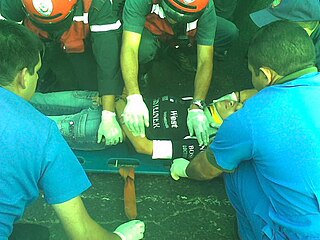
Advanced trauma life support (ATLS) is a training program for medical providers in the management of acute trauma cases, developed by the American College of Surgeons. Similar programs exist for immediate care providers such as paramedics. The program has been adopted worldwide in over 60 countries, sometimes under the name of Early Management of Severe Trauma, especially outside North America. Its goal is to teach a simplified and standardized approach to trauma patients. Originally designed for emergency situations where only one doctor and one nurse are present, ATLS is now widely accepted as the standard of care for initial assessment and treatment in trauma centers. The premise of the ATLS program is to treat the greatest threat to life first. It also advocates that the lack of a definitive diagnosis and a detailed history should not slow the application of indicated treatment for life-threatening injury, with the most time-critical interventions performed early.

The California Emergency Medical Services Authority is an agency of California State government. The California EMS Authority is one of the thirteen departments within the California Health and Human Services Agency. The director is required to be a physician with substantial experience in emergency medicine. Elizabeth Basnett is the current Acting Director.
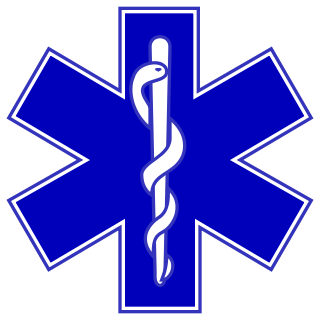
In the United States, the paramedic is a allied health professional whose primary focus is to provide advanced emergency medical care for patients who access Emergency Medical Services (EMS). This individual possesses the complex knowledge and skills necessary to provide patient care and transportation. Paramedics function as part of a comprehensive EMS response under physician medical direction. Paramedics often serve in a prehospital role, responding to Public safety answering point (9-1-1) calls in an ambulance. The paramedic serves as the initial entry point into the health care system. A standard requirement for state licensure involves successful completion of a nationally accredited Paramedic program at the certificate or associate degree level.
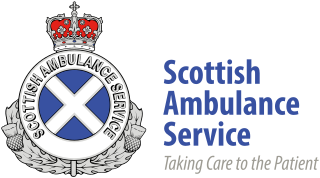
The Scottish Ambulance Service is part of NHS Scotland, which serves all of Scotland's population. The Scottish Ambulance Service is governed by a special health board and is funded directly by the Health and Social Care Directorates of the Scottish Government.

Emergency medical services in the United Kingdom provide emergency care to people with acute illness or injury and are predominantly provided free at the point of use by the four National Health Services (NHS) of England, Scotland, Wales, and Northern Ireland. Emergency care including ambulance and emergency department treatment is only free to UK residents and a charge may be made to those not entitled to free NHS care.

Emergency medical personnel in the United Kingdom are people engaged in the provision of emergency medical services. This includes paramedics, emergency medical technicians and emergency care assistants. 'Paramedic' is a protected title, strictly regulated by the Health and Care Professions Council, although there is tendency for the public to use this term when referring to any member of ambulance staff.

The British Association for Immediate Care (BASICS) is an organisation which has the stated aim to encourage and aid the formation and extension of immediate care schemes. The British Association for Immediate Care was founded as a charity in 1977 and combines bringing people together who have an interest in pre-hospital immediate care with supporting and promoting regional and local immediate care schemes across the UK.
Anaesthesia, Trauma and Critical Care (ATACC) is an international trauma and anaesthesia organisation.
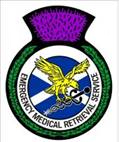
The Emergency Medical Retrieval Service (EMRS) provides aeromedical critical care retrieval and pre-hospital critical care to people in Scotland in the form of two retrieval teams. The service provides patients in remote and rural areas with rapid access to the skills of a consultant or senior doctor in emergency medicine, intensive care medicine or anaesthesia, and facilitates transfers to larger, better equipped urban hospitals. The EMRS functions supplementary to the regular Scottish Ambulance Service Air Ambulance service. Unlike air ambulance services in other parts of the UK, both services are funded by the Scottish Government.
The following outline is provided as an overview of and topical guide to emergency medicine:
The College of Paramedics is the recognised professional body for paramedics in the United Kingdom. The role of the College is to promote and develop the paramedic profession across England, Scotland, Wales and Northern Ireland.

Lincolnshire Integrated Voluntary Emergency Service, known commonly as LIVES, is a registered charity staffed by volunteers providing pre-hospital care services across Lincolnshire. LIVES operates alongside the East Midlands Ambulance Service to provide clinical and critical care skills as well as immediate medical responses in the form of community first responders. LIVES operates under the national pre-hospital care co-ordinating body, the British Association for Immediate Care. LIVES is a registered provider of healthcare with the Care Quality Commission
Mercia Accident Rescue Service is a BASICS affiliated charity operation based on providing a fast-response, advanced medical team to back up the emergency services of the English counties of Herefordshire and Worcestershire. The charity aims to provide an organisational framework within which practitioners can be properly trained and equipped to provide prehospital care, its work is supported by local fundraising. MARS is staffed by a team of 11 doctors and two advanced clinical practitioners.
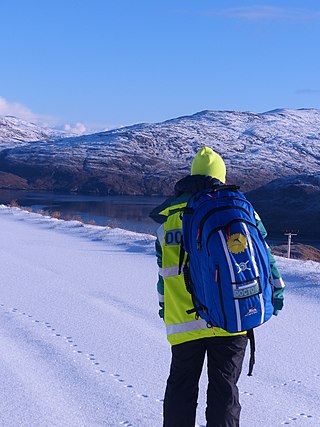
Pre-hospital emergency medicine, also referred to as pre-hospital care, immediate care, or emergency medical services medicine, is a medical subspecialty which focuses on caring for seriously ill or injured patients before they reach hospital, and during emergency transfer to hospital or between hospitals. It may be practised by physicians from various backgrounds such as anaesthesiology, emergency medicine, intensive care medicine and acute medicine, after they have completed initial training in their base specialty.

The British Association for Immediate Care Scotland is an organisation involved with prehospital care. It has the aims of providing encouragement and aid with the formation of immediate care schemes and to provide training to support those working in prehospital care. It shares its origins with the British Association for Immediate Care (BASICS), which has UK wide coverage. In 1993, the British Association for Immediate Care began running prehospital care courses in Scotland, which were met with a warm welcome and it became clear there was a large audience for such education, especially in remote and rural areas of Scotland. This need for training and organisational leadership became clearer after the 1994 Scotland RAF Chinook crash on the Mull of Kintyre. This led to the training provided by BASICS to be modified for a more rural setting, and to the development of BASICS Scotland as a separate organisation in 2002.

Peter John Firth Baskett (1934–2008) was a Northern Irish physician, specializing in anaesthesia. He was responsible for the introduction of paramedics into the United Kingdom, created specialist ambulances for delivering on-scene pain relief to patients, and was the first chairman of the European Resuscitation Council.

Sandpiper Trust is a Scottish-based charity whose aims are related to improving pre-hospital immediate care in remote and rural Scotland. It receives no Government, NHS or Local Authority funding. They are a major supporter of BASICS Scotland.

The Prehospital Immediate Care and Trauma (PICT) Team is a prehospital care team which operates from Raigmore Hospital emergency department in Inverness, Scotland. It receives funding from NHS Highland, BASICS Scotland and the Scottish Trauma Network.


















